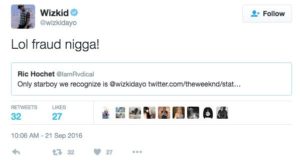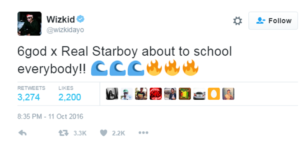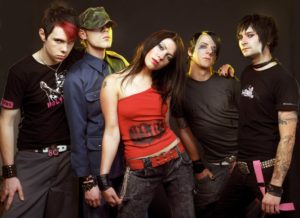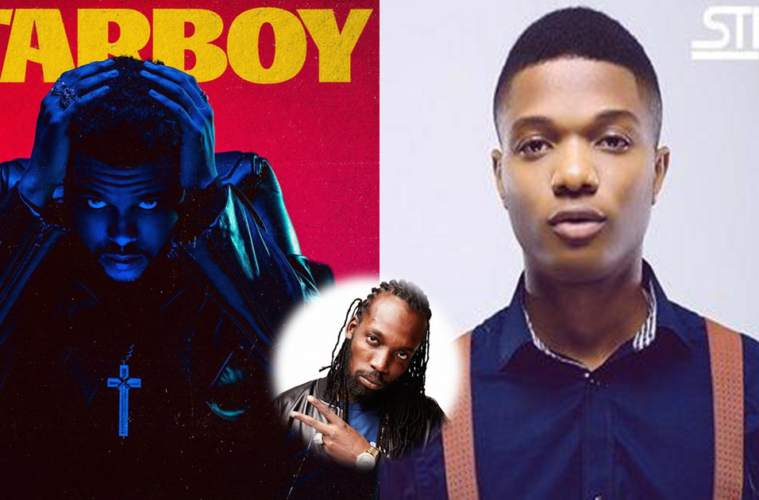2016 was supposed to be the year that Afrobeats or whatchamacallit made a name for itself on the world stage, yet one of its most successful exports Wizkid is finding it hard to hold on to one of his old names, never mind going on to make a new one for himself.
“Starboy” is Wizkid’s AKA, it has been for the last 5 years. It’s also the name of Wizzy’s imprint, which he started in Nigeria in 2013, and has become his identity, an identity that the singer is now being forced to share.
The Weeknd is a man in transition – he’s built up the ‘XO’ brand, which he too turned into an imprint, but is trying to add a new dimension to his sound and image. The Weeknd has grown from a mysterious, moody R&B singer from Canada to a Billboard mainstay and true pop heavyweight in the span of a few years, and this shift is reflected in the way he’s positioning his new music.
Two singles into the singer’s 3rd major label project and the new sound harkens back to his darker material from early mixtapes but the imagery is surprisingly upbeat, openly materialistic and very mainstream. That 3rd studio album will be released in just over a month’s time, while its lead single is currently number 2 on the Billboard charts; they’re both titled “Starboy” and that’s already a problem. However, there’s an even bigger problem and it’s that more than just being a song and an album, Starboy has become the embodiment of the Weeknd’s transition as an artist and has already become his moniker in a similar way that XO has been.
You talking ’bout me, I don’t see a shade /
Switch up my style, I take any lane /
The Weeknd “Starboy”
To tens of millions of Africans, Wizkid is the original Starboy but what would matter going forward is not what Africa thinks but what the world thinks. Weeknd got signed to Universal years before Wizkid got with Sony, so the Canadian has had a significant head start in this global match-up. It’s not even a fair battle, while Wizkid is busy trying to stay on the charts by coloring his music with the more familiar Caribbean influences, Weeknd’s style of dark and druggy alternative R&B has long been assimilated into American pop culture and he even has copycats – Weeknd is the much bigger artist. With the familiarity of his music and the popularity of his brand on his side, Weeknd has inadvertently out-muscled Wizkid for an identity that the Nigerian worked so hard to build, in a market where they are colleagues and now competitors. But pay attention, there’s a larger issue that I’m seeing the early signs of and Wizzy might just be the first victim.
America is the epicenter of global music but it’s a center that hasn’t always been kind to the originators of its influences, especially if those influencers don’t have the infrastructure in-country to profit maximally from their influence. It happened with African Americans and jazz; at a time when black people weren’t allowed to move freely, their music was, so jazz music went mainstream and left the communities where it was founded behind. It repeated itself with black people again several decades later but this time through capitalism in hip-hop. Hip-hop has had an effect on American youth culture and spending patterns that’s disproportional to the amount of money, power and freedoms available to the black communities where it originated, and rappers are often the bottom feeders in the economic food chain. A similar thing has happened with reggae/dancehall music – the music, the culture, the lingo and even the spirituality of Jamaican music has been assimilated fully into American culture but Jamaican artists – a Shabba Ranks or a Shaggy or a Sean Paul – break through only once every blue moon to profit. So if Afrobeats realizes its full potential, just like most forms of music that were able to make it to mainstream USA, history tells us that as part of the assimilation process, it will get appropriated.


Wizkid might disagree but there is no hard evidence that “Starboy” was lifted directly from his playbook. But, to my mind, even if it was, being appropriated isn’t such a bad thing for two reasons – the saying goes that imitation is the sincerest form of flattery, you’d have to have something worth taking for someone to want to take it from you in the first lace, so at least Wizkid and Nigerian music are headed in the right direction. And secondly, everyone, everywhere and in every country does it. In fact, calling what a lot of Nigerian artists do to American music appropriation would be giving “stealing” a fancy title. As a disciple of dancehall, Wizkid himself patterned his style after guys like Popcaan, you can hear it in the music and his mannerisms. And if we are talking musical inspirations and who used what word first, Mavado released a song in 2011 titled “Starboy”, a few months before Wizkid’s public self-christening – so who’s really the “real Starboy”?
A wise lawyer once told me that there’s no such thing as an original idea and if you’re lucky enough to find one, you better do your best to trademark it. That’s why I was shocked to discover that the word ‘Starboy’ isn’t actually registered as a trademark in the USA (check the Trademark Electronic Search System (TESS)). Given the haphazard nature of the music business in his home country, you can excuse Wizkid’s naivete but you would think that Weeknd, who cut out the third “e” in his name early in his career to forestall getting sued by a Canadian band called the Weekend, would be more strategic.

The Weekend (Canadian band)
Again, there is no hard evidence that “Starboy” was taken directly from Wizkid but the Toronto/Universal Records connection between Drake and Weeknd is being used to feed the narrative that Weeknd, or someone on his team, became aware enough of Wizkid and his movement after the success of “One Dance” and this name thing is more than just a coincidence.
Some things are coincidental but there are some other things that need to be given a closer look. If you ask the Weeknd’s fans, Abel’s inspirations cannot be questioned, his ideas are the world’s firsts and nobody’s seconds. If you ask Wizkid’s fans, Ayo’s thunder was stolen from him just about he was about to strike, they’ve been robbed. However, if you ask me, and I’ll be the first to admit that I’m not the most unbiased witness you’ll ever find, Nigerian music has just experienced its most blatant stick-up by an international act and history tells us this won’t be the last time.


